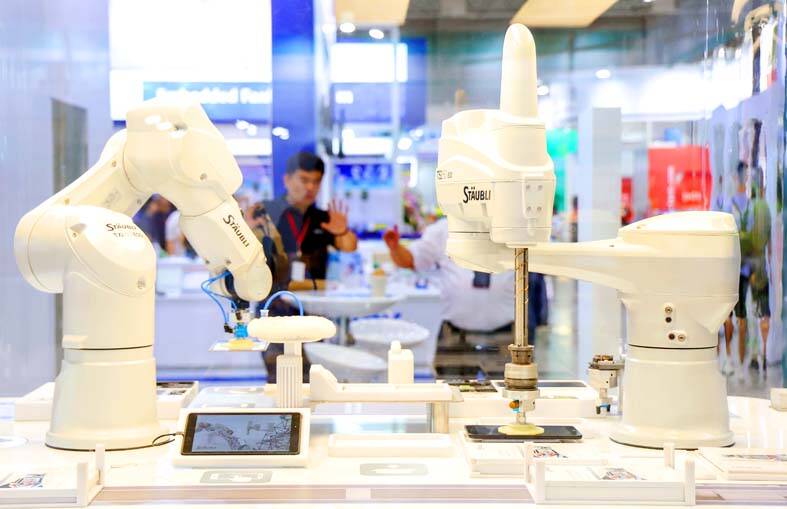Taiwan’s official manufacturing purchasing managers’ index (PMI) last month gained 0.8 points to 50.0, returning marginally to the expansion side, as firms remain cautious about political uncertainty linked to the US presidential election next week, the Chung-Hua Institution for Economic Research (CIER, 中華經濟研究院) said yesterday.
“The latest PMI data merited a neutral reading,” CIER president Lien Hsien-ming (連賢明) said.
“On one hand, it emerged from contraction, but firms remained uneasy about the landscape this quarter and beyond,” Lien said.

Photo: CNA
PMI values seek to capture the health of the manufacturing industry, with values of 50 and higher indicating expansion and values below that threshold suggesting contraction.
The latest uptick had to do with China’s introduction of monetary easing to support its economy, although fiscal stimulus measures are widely believed to be more effective in advancing that aim, Lien said.
The critical subindex on new business rose 3.4 points to 51.9, while the measure on industrial production picked up 3.7 points to 50.5, the Taipei-based think tank said, adding that the employment subindex increased by 0.7 to 50.5.
Although the three indices displayed positive cyclical movements, they hovered close to the neutral mark, suggesting a need for clear direction, the academic said.
“Many wonder if the benefit of China’s monetary easing could be sustained in the absence of fiscal stimulus,” Lien said.
In addition, firms would rather keep a cautious attitude until uncertainty over the US presidential election on Tuesday next week is settled, Lien said.
The Republican and Democratic US presidential nominees have pledged to tighten technology bans against China. The move could have a spillover effect on Taiwanese firms, as the world’s two largest economies account for more than 50 percent of Taiwan’s exports.
That explained why the reading on the six-month business outlook printed 48.3, rising 0.8 points, but staying in negative territory, which reflects a generally conservative sentiment, the institute said.
The sentiment is evident among local suppliers of electronic and optical devices, which printed 47 due to a lack of stable order visibility, CIER researcher Chen Shin-hui (陳馨蕙).
Reports of disappointing sales of new-generation smartphones and notebook computers cast further doubt on business prospects, despite the advent of the holiday season in the West, she said.
Service-oriented firms fared better given that the non-manufacturing index logged a mild gain of 0.5 points to 53.8, CIER said, citing a separate survey.
All sectors reported a business pickup with the exception of wholesale operators, it said.
Looking six months forward, firms involved in wholesale, retail, construction and real-estate brokerage expressed misgivings after the central bank stiffened lending terms to cool the housing market.

Vincent Wei led fellow Singaporean farmers around an empty Malaysian plot, laying out plans for a greenhouse and rows of leafy vegetables. What he pitched was not just space for crops, but a lifeline for growers struggling to make ends meet in a city-state with high prices and little vacant land. The future agriculture hub is part of a joint special economic zone launched last year by the two neighbors, expected to cost US$123 million and produce 10,000 tonnes of fresh produce annually. It is attracting Singaporean farmers with promises of cheaper land, labor and energy just over the border.

US actor Matthew McConaughey has filed recordings of his image and voice with US patent authorities to protect them from unauthorized usage by artificial intelligence (AI) platforms, a representative said earlier this week. Several video clips and audio recordings were registered by the commercial arm of the Just Keep Livin’ Foundation, a non-profit created by the Oscar-winning actor and his wife, Camila, according to the US Patent and Trademark Office database. Many artists are increasingly concerned about the uncontrolled use of their image via generative AI since the rollout of ChatGPT and other AI-powered tools. Several US states have adopted

A proposed billionaires’ tax in California has ignited a political uproar in Silicon Valley, with tech titans threatening to leave the state while California Governor Gavin Newsom of the Democratic Party maneuvers to defeat a levy that he fears would lead to an exodus of wealth. A technology mecca, California has more billionaires than any other US state — a few hundred, by some estimates. About half its personal income tax revenue, a financial backbone in the nearly US$350 billion budget, comes from the top 1 percent of earners. A large healthcare union is attempting to place a proposal before

KEEPING UP: The acquisition of a cleanroom in Taiwan would enable Micron to increase production in a market where demand continues to outpace supply, a Micron official said Micron Technology Inc has signed a letter of intent to buy a fabrication site in Taiwan from Powerchip Semiconductor Manufacturing Corp (力積電) for US$1.8 billion to expand its production of memory chips. Micron would take control of the P5 site in Miaoli County’s Tongluo Township (銅鑼) and plans to ramp up DRAM production in phases after the transaction closes in the second quarter, the company said in a statement on Saturday. The acquisition includes an existing 12 inch fab cleanroom of 27,871m2 and would further position Micron to address growing global demand for memory solutions, the company said. Micron expects the transaction to